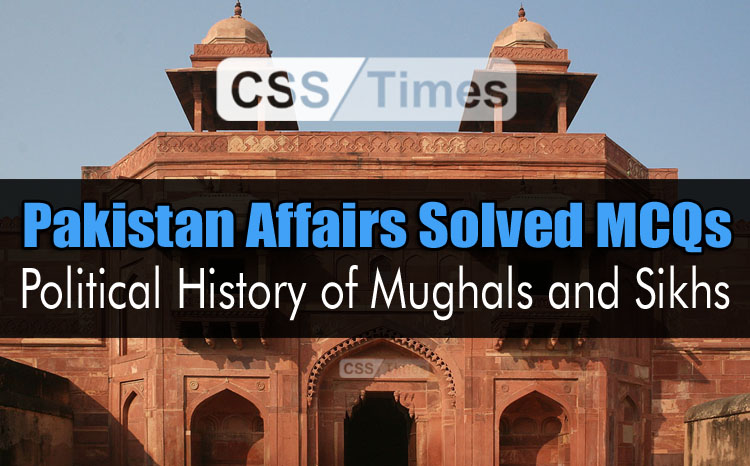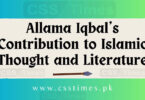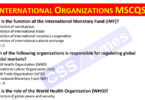Pakistan Affairs Solved MCQs
Political History of Mughals and Sikhs
For FPSC, PCS, PMS, NTS, OTS, and all other Competitive Exams
1. Who united all Sikhs and founded kingdom in Punjab?
(a) Guru Nanak
(b) Maharaja Ranjit Singh
(c) Guru Gobind Singh
(d) None of these
Answer: B
2. The Mansabdari system introduced by Akbar was borrowed from the system in:
(a) Turkey
(b) Persia
(c) Mongolia
(d) Afghanistan
Answer: C
3. Who among the following was the first Mughal emperor to allow Britishers to establish trade links with India?
(a) Akbar
(b) Jehangir
(c) Aurangzeb
(d) Shah Jahan
Answer: B
4. The capital of Mughal empire was shifted from Agra to Delhi by:
(a) Jehangir
(b) Aurangzeb
(c) Shah Jahan
(d) Humayun
Answer: C
5. The Peacock Throne was made for:
(a) Jehangir
(b) Shah Jahan
(c) Akbar
(d) Aurangzeb
Answer: B
6. In 1662 AD, Mir Jumla, the Mughal governor of Bengal led successful expedition to:
(a) Assam
(b) Tibet
(c) Orissa
(d) Auadh
Answer: A
7. Which of the following ports was the biggest port during the Mughal period?
(a) Surrat
(b) Hoogly
(c) Chittagong
(d) Balasore
Answer: A
8. The East India Company was founded in India during the reign of:
(a) Akbar
(b) Shah Jahan
(c) Jehangir
(d) Humayun
Answer: C
9. The capital of the kingdom of Maharaja Ranjit Singh was:
(a) Patiala
(b) Lahore
(c) Amritsar
(d) Kapurthala
Answer: B
10. The Sikh Guru who was fought Mughals was:
(a) Guru Nanak
(b) Guru Gobind Singh
(c) Guru Arjun Dev
(d) Guru Teg Bahadur
Answer: B
11. The Mughal empire in India was founded by:
(a) Akbar the Great
(b) Zahir-ud-Din Babur
(c) Shah Jahan
(d) Aurangzeb
Answer: B
12. When Akbar was young, his guardian was:
(a) Hemu
(b) Faizi
(c) Bairam Khan
(d) Abdul Fazal
Answer: C
13. The two great Mughal rulers who wrote their own memoirs are:
(a) Babur and Humayun
(b) Humayun and Akbar
(c) Babur and Jehangir
(d) Shah Jahan and Aurangzeb
Answer: C
14. The court language of Mughals was:
(a) Arabic
(b) Persian
(c) Hindi
(d) Urdu
Answer: B
15. Who initiated Din-i-Ilahi?
(a) Shah Jahan
(b) Akbar
(c) Aurangzeb
(d) Jehangir
Answer: B
16. Revenue system during Akbar’s reign was in the hands of:
(a) Bairam Khan
(b) Todar Mal
(c) Birbal
(d) Man Singh
Answer: B
17. Akbar assumed actual control over the administration of his empire in:
(a) 1556
(b) 1562
(c) 1558
(d) 1590
Answer: A
18. Babur laid the foundation of Mughal empire in 1526 by defeating:
(a) Daulat Khan Lodhi
(b) Ibraham Lodhi
(c) Rana Sangha
(d) Alauddin Khilji
Answer: B
19. During the reign of which of the following emperors was the artillery most perfect and numerous?
(a) Akbar
(b) Aurangzeb
(c) Shah Jahan
(d) Jehangir
Answer: B
20. Who consolidated the Mughal empire and gave it a unique multi-religious culture?
(a) Akbar
(b) Humayun
(c) Jehangir
(d) Aurangzeb
Answer: A
21. Akbar’s land revenue system was known as:
(a) Bandabast system
(b) Zabti system
(c) Todarmal’s revenue
(d) All of them
Answer: B
22. Who among the following Mughal rulers was ignorant of the art of reading and writing?
(a) Babur
(b) Akbar
(c) Jehangir
(d) Aurangzeb
Answer: B
23. The Mughal ruler Bahadur Shah Zafar was exiled by British and sent to:
(a) Manadalay
(b) Rangoon
(c) Hyderabad
(d) None of these
Answer: B
24. Din-i-Ilahi was accepted by:
(a) Birbal
(b) Tanseen
(c) Todarmal
(d) Raja Man Singh
Answer: A
25. The first Mughal emperor to issue a firman in favour of the British to open a factory at Surat was:
(a) Aurangzeb
(b) Jehangir
(c) Akbar
(d) Shah Jahan
Answer: B
26. Babur won the First Battle of Panipat mainly because of:
(a) His military skills
(b) His cavalry
(c) Afghan’s disunity
(d) None of these
Answer: A
27. The ‘Jiziya’was abolished by:
(a) Muhammad bin Tughluq
(b) Akbar
(c) Babur
(d) Sher Shah
Answer: B
28. The bitterest war of succession under the great Mughals was fought among the sons of:
(a) Babur
(b) Shah Jahan
(c) Aurangzeb
(d) Jehangir
Answer: B
29. Sher Shah is credited for introducing for the first time the following measures except:
(a) Postal system
(b) Currency system
(c) System of spying
(d) Land revenue system
Answer: B
30. Which of the following statements about Ranjit Singh is incorrect?
(a) He posed a great challenge and resistance to the British.
(b) He wanted to form a separate Sikh state.
(c) He organised an excellent army.
(d) None of these
Answer: A
31. The Mughal emperor who died due to a sudden fall from the staircase was:
(a) Babur
(b) Humayun
(c) Jehangir
(d) Aurangzeb
Answer: B
32. Which Mughal emperor was the most secular in outlook?
(a) Babur
(b) Akbar
(c) Aurangzeb
(d) Jehangir
Answer: B
33. Who among the following was regarded as “Zinda Pir”?
(a) Babur
(b) Aurangzeb
(c) Akbar
(d) Jehangir
Answer: B
34. Before the rise of Ranjit Singh, Punjab was under the control of:
(a) Marathas
(b) Raider groups
(c) Sikh Misls
(d) Tribal chiefs
Answer: A
35. During Aurangzeb’s reign, which of the following were not included in the government?
(a) Rajputs
(b) Marathas
(c) Pathans
(d) None of these
Answer: B
36. In 1809 Maharaja Ranjit Singh signed a treaty with:
(a) East India Company
(b) Shah Alam
(c) King of Kashmir
(d) Ruler of Sindh
Answer: A
37. Who installed the “Chain of Justice”?
(a) Babur
(b) Humayun
(c) Jehangir
(d) Akbar
Answer: C
38. In the Mughal administration, military recruitment was being looked after by:
(a) Diwan
(b) Wazir
(c) Bakhshi
(d) Kotwal
Answer: C
39. Where did Babur die?
(a) Kabul
(b) Agra
(c) Lahore
(d) Delhi
Answer: B
40. Babur entered India for the first time from the west through:
(a) Kashmir
(b) Sindh
(c) Punjab
(d) Rajasthan
Answer: C
41. The bone of contention between the Shah of Persia and the Mughals was the control of:
(a) Kabul
(b) Kandhar
(c) Ghazni
(d) Kunduz
Answer: B
42. Maharaja Ranjit Singh signed a treaty of perpetual friendship with the British in the year 1809 at:
(a) Ferozpur
(b) Amritsar
(c) Faridkot
(d) Ludhiana
Answer: B
43. Akbar has been called the first national king, mainly because he:
(a) Was highly tolerant and secular in his outlook.
(b) Was a great administrator.
(c) Established a new religion.
(d) Provided an efficient government.
Answer: A
44. Sher Shah made revenue settlement with:
(a) Mansabdars
(b) Cultivators
(c) Jagirdars
(d) Zamindars
Answer: B
45. Sher Shah’s real name was:
(a) Hemu
(b) Faizi
(c) Farid Khan
(d) Bahadur
Answer: C
46. The designation ‘Amil’ in Akbar’s time meant:
(a) Custom officer
(b) Revenue officer
(c) Sacred law
(d) Sacred book
Answer: B
47. The king generally considered to be the greatest ruler of Kashmir in the 15th century was:
(a) Yousaf Shah
(b) Zain-ul-Abidin
(c) Hyder Shah
(d) Shah Mirza
Answer: B
48. Who amongst the following Mughals is regarded more as an adventurer than a ruler?
(a) Babur
(b) Jehangir
(c) Akbar
(d) Aurangzeb
Answer: A
49. Lane Poole, the historian writes “____ the Emperor tumbled through life, and he tumbled out of it.”
(a) Babur
(b) Humanyun
(c) Akbar
(d) Jehangir
Answer: B
50. Delhi became the established capital of Mughal kings during the reign of:
(a) Sher Shah Suri
(b) Akbar
(c) Jehangir
(d) Humayun
Answer: B








Dehli became capital in Shah Jahan reign